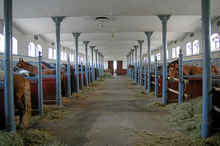Routine hoof care: What, how and why

Routine hoof care is essential
Basic hoof care is easy, requires just a few low cost tools, and may prevent hoof disease.
Keeping your horse's hooves in the best condition possible is up to you as the owner.
Here are 10 things you can do to maintain healthy horse's hooves:
- Know the anatomy of your horse's hooves. As one of the most important parts of your horse, the hooves can give you valuable information about the state of the health of your horse. In addition, knowledge of the hooves' anatomy will enable you to maintain clean, well-picked hooves.
- Handle your horse's hooves on a regular basis so your horse is comfortable with having its hooves picked up and worked on. Gaining the horse's trust when having its hooves worked on can be invaluable in an emergency situation.
- When lifting the horse's foot, bend the leg back at its natural angle and not off to the side, making the position comfortable for both the horse and yourself. Some horses are trained to pick up their feet when the horny growth on the inside of the elbow or hock is gently squeezed.
- Right before you ride and right after you ride, pick your horse's hooves. Look for rocks, nails, twigs, and other debris that may be lodged in the underside of the hoof.
- Be sure to clean out the areas around the frog, but don't scrape the frog itself.
- After picking the hoof, use a hoof brush to wipe away any excess dirt in the foot. This will help you see any rocks, debris, or objects that might be lodged inside.
- Examine the hooves for any signs of thrush (a fungal disease), hoof cracks, stone bruises, abscesses, laminitis, or other conditions that might affect your horse's hoof health on a daily or regular basis.
- Keep your horse's bedding clean and dry to discourage bacterial growth. Don't let your horse stand in urine-soaked bedding or accumulated manure and avoid keeping your horse in a muddy pasture or paddock.
- Feed your horse a balanced diet that isn't too rich in carbohydrates to maintain good, inner-hoof health.
- Ride and stable your horse on good footing to prevent injury and keep hooves healthy.

Reduce hoof problems by keeping the barn clean
Bacteria thrives in wet piles of manure and bedding. Routine cleaning reduces the chances of thrush and other horse hoof conditions.
As the owner of one or many horses, taking hoof care seriously is an important aspect of being a good horseman. Keeping an eye out for developing hoof problems and treating them promptly can prevent serious conditions from developing that may lead to lameness or more serious consequences.
Keeping stables, pastures, barns and stalls clean, free of wet or dirty bedding material, and clear of obstacles that might cause injury are other important obligations of the horse owner.
Always contact your veterinarian or farrier when problems arise with your horse's hooves. They have the knowledge and expertise to diagnose and treat any problems your horse might have.
Consider this
For want of a nail, the shoe was lost; for want of a shoe, the horse was lost; and for want of a horse, the rider was lost.... -- Benjamin Franklin, Poor Richard's Almanac, June 1758.
